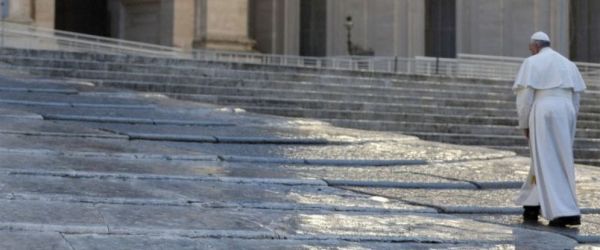There are Christians who have "a certain allergy to preachers of the word": they accept "the truth of revelation" but not "the preacher", preferring "a caged life". It happened in Jesus' time and unfortunately continues to happen today in those who live closed in on themselves, because they are afraid of the freedom that comes from the Holy Spirit.
For Pope Francis, this is the teaching that comes from the readings of the liturgy celebrated on Friday morning, 13 December, in the chapel of Santa Marta. The Pontiff dwelt above all on the passage from the Gospel of Matthew (11, 16-19) in which Jesus compares the generation of his contemporaries "to those children sitting in the squares who turn to their companions and say: we played the flute and you did not dance, we sang a lament and you did not weep".
In this regard, the Bishop of Rome recalled that Christ in the Gospels "always speaks well of children", offering them as a "model of Christian life" and inviting them to "be like them to enter the kingdom of heaven". Instead, he noted, in the passage in question "it is the only time he does not speak so well of them". For the Pope, it is an image of children who are "a bit special: rude, discontented, even scornful"; children who do not know how to be happy while playing and who "always refuse the invitation of others: nothing goes well for them". In particular, Jesus uses this image to describe "the leaders of his people", defined by the Pontiff as "people who were not open to the word of God".
For the Holy Father there is an interesting aspect in this attitude: their rejection, precisely, "is not for the message, it is for the messenger". It is enough to read the Gospel passage to confirm this. "John came, who neither eats nor drinks," the Pope noted, "and they said: he has a devil. The Son of Man came, who eats and drinks, and they said: here is a glutton and a drunkard, a friend of publicans and sinners'. In practice, people have always found reasons to delegitimise the preacher. Just think of the people of that time, who preferred 'to take refuge in a somewhat elaborate religion: in moral precepts, like the Pharisees; in political compromise, like the Sadducees; in social revolution, like the Zealots; in Gnostic spirituality, like the Essenes'. All of them, he added, "with their own neat, well-made system", but which does not accept "the preacher". That is why Jesus refreshes their memory by reminding them of the prophets, who were persecuted and killed.
Accepting "the truth of revelation" and not "the preacher" reveals for the Pontiff a mentality that is the result of "a life caged in precepts, in compromises, in revolutionary plans, in spirituality without flesh". Pope Francis referred in particular to those Christians "who allow themselves not to dance when the preacher gives you good news of joy, and allow themselves not to cry when the preacher gives you sad news". To those Christians, that is, 'who are closed, caged, who are not free'. And the reason is the "fear of the Holy Spirit's freedom, which comes through preaching".
Moreover, "this is the scandal of preaching of which St Paul spoke; the scandal of preaching that ends in the scandal of the cross". In fact, 'it scandalises us that God speaks to us through men with limitations, sinful men; and it scandalises us even more that God speaks to us and saves us through a man who says he is the son of God, but ends up as a criminal'. So for Pope Francis we end up covering up 'the freedom that comes from the Holy Spirit', because ultimately 'these sad Christians do not believe in the Holy Spirit; they do not believe in that freedom that comes from preaching, which admonishes you, teaches you, even slaps you, but it is precisely freedom that makes the Church grow'.
So the image of the Gospel, with "children who are afraid to dance, to cry", who are "afraid of everything, who ask for security in everything", makes one think of "these sad Christians, who always criticise the preachers of truth, because they are afraid to open the door to the Holy Spirit". Hence the Pontiff's exhortation to pray for them and also to pray for ourselves, so that "we do not become sad Christians", those who take away "the Holy Spirit's freedom to come to us through the scandal of preaching."
[Pope Francis, St. Martha, in L'Osservatore Romano 14/12/2013]












